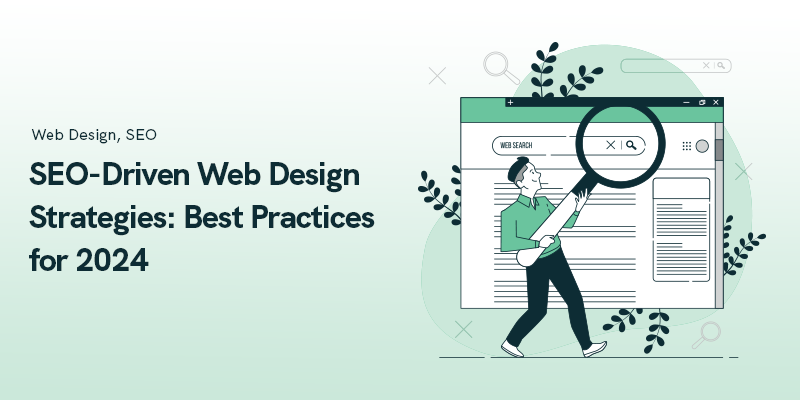
SEO-Driven Web Design Strategies: Best Practices for 2024
Both Search Engine Optimization (SEO) and website design are factors, in the success of any business operating in the realm. SEO works to enhance the visibility of a website by boosting its ranking on search engine results pages (SERPs) thus drawing in targeted traffic.
By optimizing content keywords and technical elements SEO ensures that the website attracts visitors who're likely to become customers.
On the hand, web design focuses on creating appealing and user-friendly websites. A crafted site improves user experience builds trust and encourages visitors to explore the content.
The interplay between SEO and web design is clear as they complement each other.
While a stunning website may struggle to attract traffic without SEO optimization, a site, with SEO but lacking in design quality may encounter difficulties retaining visitors and converting leads.
Ultimately SEO services and web design collaborate to ensure a website not only ranks well but also provides a user experience leading to increased visibility, traffic, and conversions online.
In the ever-evolving digital ecosystem, having a stunning website is just the beginning.
With billions of searches conducted daily on search engines like Google, Bing, and Yahoo, ensuring your website stands out amidst the noise is paramount.
This is where the concept of optimizing web design for search engines, commonly known as SEO (Search Engine Optimization), becomes indispensable.
Optimizing web design for search engines involves a strategic approach to designing and developing websites that not only appeal to human users but also meet the criteria set by search engine algorithms.
It's about creating a harmonious balance between aesthetics, functionality, and technical elements to enhance visibility, drive organic traffic, and ultimately achieve business objectives.
In this digital age, where competition is fierce and attention spans are fleeting, businesses cannot afford to overlook the importance of SEO in their web design endeavors.
By embracing SEO principles from the outset of the design process, companies can ensure their websites not only look visually appealing but also rank well in search engine results pages (SERPs), thereby maximizing their online presence and reaching their target audience effectively.
Importance of SEO in Driving Organic Traffic to Websites
In the competitive world of the internet being visible is crucial, for success. With websites competing for attention standing out can be quite a challenge.
This is where SEO (Search Engine Optimization) comes into play as a tool for driving traffic to websites.
Boosting Visibility; SEO plays a role in enhancing a website's presence on search engine results pages (SERPs). By optimizing aspects like content, meta tags, headings, and URLs SEO helps search engines better comprehend and index web pages thus improving their chances of appearing in relevant search queries.
Targeted Audience; Unlike paid advertisements that target users based on demographics or interests organic traffic generated through SEO is more specific in nature. This is because it arises from users actively looking for information, products, or services related to keywords or topics. Consequently, organic traffic typically consists of users who are more likely to convert into customers or engage with the content.
Credibility and Reliability; Websites that rank higher in search results are often viewed as credible and reliable by users. This perception stems from the fact that search engines like Google employ algorithms to evaluate factors such, as relevance, authority, and user experience when assessing website rankings.
Websites that rank high in search results convey credibility to users building trust and confidence.
Cost Effectiveness; Paid advertising may show results. Demands significant time and resources. On the other hand, SEO presents a budget-friendly approach, for driving website traffic in the long run. Once a website secures positions in search results it can attract visitors without continuous ad costs making SEO a sustainable and economical choice.
Long-Term Growth; Unlike lived traffic spikes, from marketing strategies, SEO offers lasting benefits. By enhancing a website's SEO performance businesses can establish an online presence that grows steadily over time. This enduring strategy not only ensures traffic but also bolsters brand visibility and recognition in the digital realm.
Exploration of Design Trends in 2024 and Their Impact on User Engagement
In the changing world of web design, it's crucial to stay in the game to create captivating and memorable digital experiences.
As we step into 2024 designers are embracing trends that not only draw in audiences but also boost user interaction and satisfaction. Lets take a look, at some of these design trends and how they influence user engagement in the realm of web design company like OWDT.
Immersive Experiences; Thanks to advancements designers are increasingly focused on developing experiences that blend the digital and physical realms. Techniques like augmented reality (AR) virtual reality (VR) and 3D graphics are used to immerse users in environments. Web design firms are leading the way in this trend by using state-of-the-art tools and technologies to create websites that make an impact on visitors.
Dark Mode Design; Dark mode design has become a trend recently offering a modern alternative to traditional light interfaces. By reducing eye strain saving battery life and providing a look dark mode design has garnered widespread appeal, among users. Web design companies are adopting this trend by incorporating mode options into their website designs allowing users to personalize their browsing experience while boosting user engagement at the time.
Sustainability and Environmentally Friendly Design; With the increasing awareness of issues designers are incorporating sustainability principles into their work more, than ever. Web design firms are focusing on using eco materials and optimizing energy use to align with conscious practices in their design process. By demonstrating their dedication to sustainability these companies not only appeal to clients who value responsibility but also connect with users who prioritize ethical and eco-friendly brands leading to enhanced user engagement and loyalty.
Flexible Design; In a time where personalization's key users expect customized experiences that cater to their preferences and requirements. Web design companies are meeting this expectation by implementing adaptable design methods that adjust content and layouts dynamically based on user actions, demographics, and preferences. By providing content tailored to the users context personalized design boosts user engagement levels. Promotes deeper interactions, with websites.
Voice User Interface (VUI) Design; The increasing popularity of voice-activated devices and virtual assistants has made voice user interface (VUI) design a trend in 2024. Web design firms are exploring ways to incorporate voice interaction into their websites allowing users to navigate search for information and engage using natural language commands.
VUI design improves accessibility, convenience, and engagement, for users, with disabilities or limited mobility by offering a hands intuitive user experience.
Conclusion
To summarize, the design trends of 2024 are pushing the limits of creativity and innovation. They emphasize crafting immersive experiences, adopting dark mode design, prioritizing sustainability, personalizing user interactions, and integrating voice user interfaces.
Web design firms are pivotal in shaping these trends, using them to enrich user engagement, satisfaction, and loyalty online.
By embracing these shifts and staying abreast of changing user desires, these companies can develop captivating digital experiences that deeply connect with audiences and yield significant results.
Recommended Posts

Boost Event Visibility with MEC’s Top SEO Features in 2025
February 3, 2025

12 Best Google Chrome Screenshot Extensions for 2025
July 30, 2024

10 Best Web3 Design Agencies in 2025
July 30, 2024
